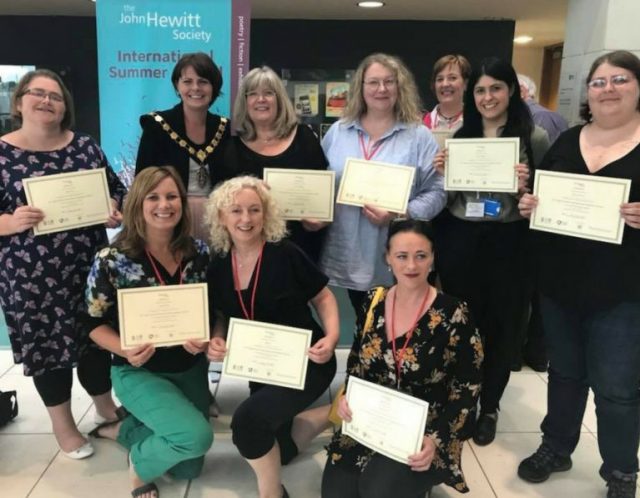 The evening before this year’s John Hewitt International Summer School kicked off, I was sat on a bench out the back of the Charlemont Arms hotel alongside some of my fellow bursary students, sipping a pint of Diet Coke while others had a smoke. The group of us had only just met and were getting to know each other ahead of the crazy week-long adventure we were about to have.
The evening before this year’s John Hewitt International Summer School kicked off, I was sat on a bench out the back of the Charlemont Arms hotel alongside some of my fellow bursary students, sipping a pint of Diet Coke while others had a smoke. The group of us had only just met and were getting to know each other ahead of the crazy week-long adventure we were about to have.
“You’re very young,” I was told by one of them, with a tone somewhere between surprise and confusion.
“Okay,” I replied, because I had no idea how else to respond. I found it kind of amusing, I suppose, that this was someone’s initial reaction to me.
When the week started in earnest, though, I heard the comment again. And again.
“Everyone keeps telling me I’m really young!”
“Well, you are.”
This got me thinking, because I was certainly not the youngest person there and I’m not particularly babyfaced. I am, in fact, almost thirty.
In reply to my initial post about JHISS in which I said I was intimidated by the heavy schedule, someone said, “If you feel intimidated, imagine how I must feel!’
What I conclude, taking those bits of context into consideration alongside the “very young” comments, is that people don’t think I’m young in per se. If you’re one of the people who made these comments, you can correct me on this, but what I think is happening is that I – somehow – have given the impression that I’m accomplished, or established, or vaguely know what I’m doing, or… something. The surprise seems to come from the fact that I have achieved this mystical level of influence/achievement at my age whereas for most people it comes much later if even at all.
Just typing that out makes me feel uncomfortable; like I’m bragging or something, but I don’t know how else to figure it. I certainly don’t feel impressive for my age. In fact, I panic fairly frequently that I haven’t done enough and should be doing more – should be being more.
On these expectations, I have also been musing. Continue reading →
 This is the final piece of writing I did during Bernie McGill’s fiction workshops at the John Hewitt International Summer School. Short but, I hope, still able to strike a chord. Based off prompts given in the class.
This is the final piece of writing I did during Bernie McGill’s fiction workshops at the John Hewitt International Summer School. Short but, I hope, still able to strike a chord. Based off prompts given in the class.
 The evening before this year’s John Hewitt International Summer School kicked off, I was sat on a bench out the back of the Charlemont Arms hotel alongside some of my fellow bursary students, sipping a pint of Diet Coke while others had a smoke. The group of us had only just met and were getting to know each other ahead of the crazy week-long adventure we were about to have.
The evening before this year’s John Hewitt International Summer School kicked off, I was sat on a bench out the back of the Charlemont Arms hotel alongside some of my fellow bursary students, sipping a pint of Diet Coke while others had a smoke. The group of us had only just met and were getting to know each other ahead of the crazy week-long adventure we were about to have. Today, I want to share another short piece I wrote during Bernie McGill’s writing workshops at the John Hewitt International Summer School. We were given a list of first lines from existing stories, without initially being told what those stories were, to see what ideas we could spark off them.
Today, I want to share another short piece I wrote during Bernie McGill’s writing workshops at the John Hewitt International Summer School. We were given a list of first lines from existing stories, without initially being told what those stories were, to see what ideas we could spark off them.
 While at the John Hewitt International Summer School, I took a three-day workshop with Bernie McGill and, over the course of those three days with her, I completed a few different writing exercises. Below is what resulted from one of those. I was given a photo prompt and some starting words. I’m not sharing the photo for copyright reasons, but you should be able to gather from my description what it depicted.
While at the John Hewitt International Summer School, I took a three-day workshop with Bernie McGill and, over the course of those three days with her, I completed a few different writing exercises. Below is what resulted from one of those. I was given a photo prompt and some starting words. I’m not sharing the photo for copyright reasons, but you should be able to gather from my description what it depicted.